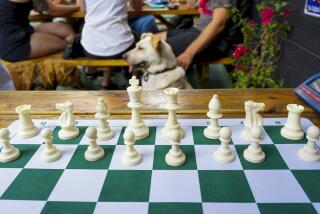Gisela Gresser; Chess Pioneer Won National Title 9 Times
- Share via
Gisela Kahn Gresser, a nine-time national chess champion who rose to prominence in her game at a time when women were thought incapable of withstanding the rigors of tournament competition, died Dec. 4 in Manhattan. She was 94.
Gresser was a dominant figure in women’s chess for more than 30 years. She won nine titles between 1944 and 1969 and was the first woman in the United States to achieve master’s standing.
She began to play the game seriously in the late 1930s, when women were recognized only occasionally as solvers and composers of chess problems, but not as full-fledged tournament players. Unlike most of the men in tournament play, who came to the game as children, she was in her 30s when she became a serious student of chess.
But by the time Gresser was 38, she had won the first of her nine U.S. women’s chess championships.
“She was a leading force in American chess for a long, long time,” said Arthur Bisguier, a U.S. Chess Hall of Fame grandmaster and Gresser’s former tutor.
She was also a sort of Renaissance woman who knew several languages, could paint like the old Flemish masters and play Bach and Handel on the flute. She saw herself as “a timid and nervous sort,” yet was tremendously resourceful, going on safari in Africa in her 80s and surviving several days stranded in the Libyan desert when her plane failed.
Gresser was one of a handful of women to achieve dominance in chess in the 1940s and ‘50s. The others included Sonja Graf Stevenson, Mary Bain and Mona May Karff. Karff, a Russian immigrant who won seven U.S. women’s championships, became an international woman master the same year as Gresser, in 1950, when the International Chess Federation created the title to encourage women’s competition.
Unlike most other women, however, Gresser often competed against men. Even at 82, she was the only woman to play in an Italian tournament for masters. She was the first woman inducted into the U.S. Chess Hall of Fame.
“She showed that women could play. That was one of her claims to fame,” said Ion Gresser, one of her two sons.
Born in Detroit in 1906, she was familiar with the game as a child because of her father, Julius Kahn, an engineer who invented reinforced concrete and helped his architect-brother, Alfred, build Detroit’s auto factories.
She studied classics at Radcliffe and won a prestigious Charles Elliott Norton fellowship to continue her studies in Athens. In 1927 she returned to New York and married William Gresser, a New York City attorney and musicologist, who died in 1982.
On a cruise from France to New York in the late 1930s, Gresser borrowed a chess manual from a fellow passenger and taught herself how to play at a high level. By the end of the cruise, she was hooked on the game.
She attended the first U.S. Women’s Chess Championship, held in 1938 at New York’s Rockefeller Center. By 1940 she was competing in it, and in 1944 she won it for the first time.
In 1950 she defied the wishes of husband and friends to undertake an arduous journey to Moscow as one of two Americans invited to compete in an international women’s tournament. She also represented the U.S. at international events in Bulgaria and Yugoslavia, and played in five Women’s Candidates tournaments and three Women’s Chess Olympiads. She was Women’s World Chess Championship Challenger in 1949 and 1950 and won a U.S. Women’s Open Championship in 1954.
Bisguier, who coached Gresser once a week for 30 years at her Park Avenue apartment, remembered her as a “very diligent” student. “She didn’t necessarily believe in [chess] books, but she wrote notebooks full of everything I’d tell her, every variation,” he said. “She was a very intelligent woman.”
Among the men she played during her long career was Bobby Fischer. Before he became the youngest world grandmaster at age 15, his mother called Gresser for advice one day. The prodigy was balking at going to school, and his mother wanted to know what Gresser thought of his chances in the world of chess.
“She said he was a wonderful genius at chess,” Ion Gresser recalled. “She said, ‘Let him play chess.’ ”
Gresser is survived by another son, Julian; a brother, Julius Kahn Jr.; and two grandchildren.
More to Read
Go beyond the scoreboard
Get the latest on L.A.'s teams in the daily Sports Report newsletter.
You may occasionally receive promotional content from the Los Angeles Times.











